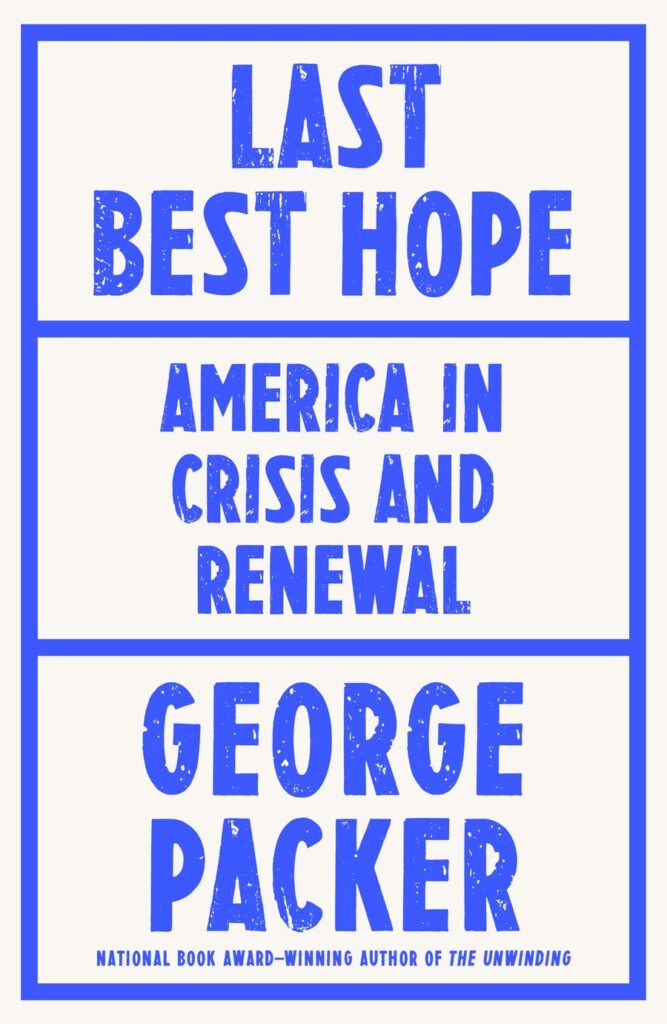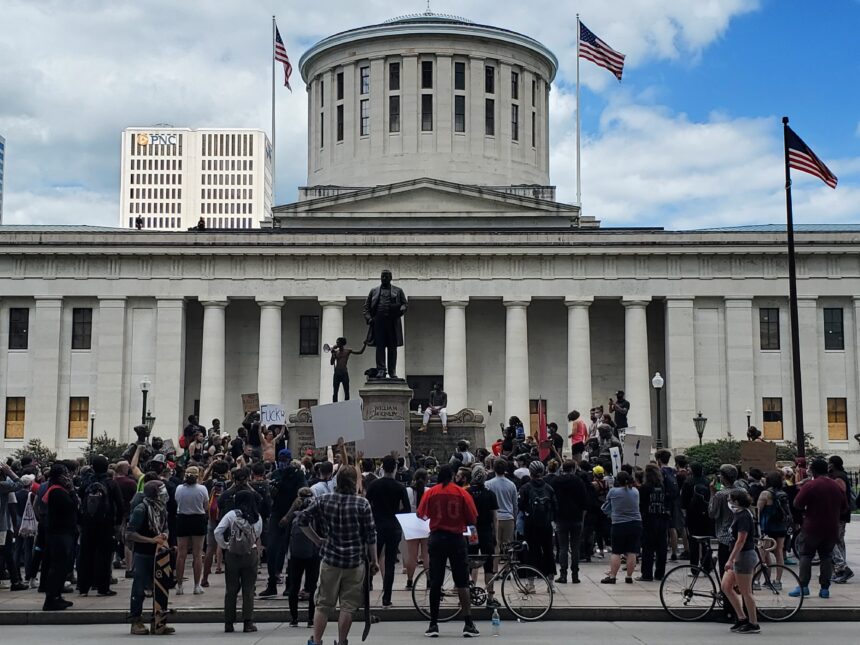
Last Best Hope: America in Crisis and Renewal
by George Packer
Farrar, Straus and Giroux
226 pp., $27.00
Abraham Lincoln’s remarks to Congress in 1862, imploring it to preserve lives and treasure by freeing and recolonizing the slaves and by compensating their owners, inspire the title of this latest work by journalist George Packer. Freeing the slaves, Lincoln said, would preserve the most democratic system of government in the world, “the last best hope of earth.”
Here we are again, Packer tells us, on the cusp of disaster. We’re at risk of losing American democracy and the hard-won Civil Rights value of equality. The culprit this time is not slavery but the division of America into distinct tribes—particularly the emergence of a tribe of red state, red-hat wearing Americans. “The idea of governing ourselves as equals has lost its hold on us,” Packer laments.
The immediate problem with Packer’s thesis is that democracy and equality don’t necessarily go together like soup and sandwich. Sometimes they are in tension, and sometimes legislatures and courts sacrifice one for the other. The other problem is that although Packer exalts democracy, he frankly hates approximately half the American voting population, a paradox that makes the reader curious about his concern about division from the people he detests.
Packer sees America divided into four categories: Free Americans (libertarians), Real Americans (proles), Smart Americans (limousine liberals), and Just Americans (social justice warriors). The reader may notice right away that these categories apply only to white America, which is the audience that he addresses exclusively. Blacks and other ethnic groups do not fit well into his four categories, for he asserts that libertarians are historically racist and that the proles tend to be white nationalists.
On Packer’s good-guy side of the ledger, Smart Americans are the top 10 percent of earners of a superior social class and pedigree. And the Just Americans are the environmentalists, gender-benders, political protestors, and top university administrators pushing critical race theory. Blacks are Packer’s central focus as a victim class, but they don’t fit into any of his four buckets, yet oddly enough, he doesn’t categorize them as a fifth American class.
Packer attempts to exhibit both sympathy and criticism for members of each of his four categories, but he hurls special invective at the Real Americans, especially former President Donald Trump and his supporters. Packer does concede that Trump’s supporters have suffered under policies of unfettered immigration and free trade. But as a Smart American himself, Packer offers no support for reduced immigration or fair trade to provide some measure of equality for Real Americans.
Perhaps the backwardness of Trump supporters repels him. They are “stupid and cruel” with “sagging bellies and jeans,” he writes. They are “uncredentialed” and seek “equality in servitude to” Trump. After all the vituperative slander, it surprises one that part of Packer’s solution to the ugly schisms that threaten our democracy is for all of us to spend more time together.
The main counterweights to Real Americans are Smart Americans: educated, successful, meritocratic, and capitalistic. They are also insecure and utterly indifferent to the real-world problem of inequality. Smart Americans fear suffering misfortunes that cast them to the depths of Real America, which Packer calls “a dim world of processed food, obesity, divorce, addiction, online education scams, stagnant wages, [and] rising morbidity rates.”
Of course, fear of another social class is not unique to Smart America. When Real America peers up at Smart America, they see anorexia, vanity degrees, gender-fluid children, and old age without grandchildren. “Maybe I’m better off staying in Zanesville,” the Real American thinks.
To his credit, Packer renounces Just America’s replacement of equality with equity, which favors outcomes over opportunities and groups over individuals. And he criticizes the length of public school closings during COVID. Packer says that students “quietly suffered permanent damage” as a result of the year out of school. He also criticizes teachers’ unions for insisting on remote learning while other communal entities opened up, and he seems to think that a complete two-week lockdown would have eradicated the virus.
However, he complains that protesters in Trump regalia made themselves “morally ugly” in protesting pandemic lockdowns, including at the Ohio statehouse. These exhibitions “foreshadowed the more dramatic” Jan. 6, 2021 events of the Capitol protests, Packer conjectures.
On the subject of political violence between his classes of Americans, Packer is selective and misinformed. The real mayhem at the Ohio statehouse occurred in May 2020 when Black Lives Matter and Antifa protested the killing of George Floyd by breaking the windows of our capitol and illegally entering the building. Over $1.2 million in damage was done to the statehouse and to the surrounding downtown Columbus in the first four days of rioting, which then continued intermittently for months and has provoked a relentless crime wave since then. Rioters broke every window in the first floor of my condominium building and vowed to return.
In response, our mayor did nothing but denounce racism. Fortunately, our governor did call out the National Guard to keep us all from getting killed.
But to George Packer, the mild protest over lockdowns by Real American Trump supporters is morally ugly. What about these Just American rioters? Surely what they did was an assault on democracy?
Mostly, blacks are given a pass in Last Best Hope. According to Packer, Black Lives Matter was created in response to “violence against Black people”—specifically George Zimmerman’s self-defense killing of Trayvon Martin and his acquittal (which in fact showed the world that our criminal justice system still sometimes works). The law and the facts prevented the state and federal governments from bringing charges against Darren Wilson, the Ferguson, Missouri police officer who shot and killed Michael Brown in 2014. Then there is the black criminal in Kenosha, Wisconsin, Jacob Blake, whom police shot and wounded after he refused to drop the knife with which he had threatened a police officer. Packer claims that the officer “tried to kill” Blake, “who appeared to offer no immediate threat.” For obvious reasons, the police were not charged.
Left unaddressed in Packer’s book are instances of black police officers killing unarmed white women. Former Minneapolis police officer Mohamed Noor shot Justine Damond as she approached his squad car after she had called 911 to report a possible rape. Capitol police officer Michael Byrd shot unarmed Ashli Babbitt as she attempted to enter a secure area of the nation’s Capitol on Jan. 6. Neither killing gets a mention by Packer.
But the biggest problem with Last Best Hope is its utter irrelevancy in both misdiagnosing the problems and offering lame solutions. The author’s recommendations for overcoming inequality sound like rehashed high school debate topics from 60 years ago; platitudes like mandatory national service and mandatory voting. Rather than unpacking Packer’s absurdities, I’ll offer four recommendations of my own—which are probably equally implausible, but are at least things worth wishing for.
First, we should drill courtesy into our social interactions. Perhaps we should send every household a copy of Emily Post’s bestseller, Etiquette: Manners for Today. Employing common courtesies in our social encounters, beginning at an early age, might hardwire them. Other reforms will then be easier once civility is established as the norm.
Second, we must emphatically teach personal responsibility. If liberals really believe in experts, they should cite research from the Brookings Institution, which has found that the poverty rate is very low for those who graduate from high school, get a full-time job, and postpone both marriage and childbearing until age 21. Conversely, the poverty rate is very high for those who do not take these basic steps that affirm personal responsibility. In other words, the five Americas should strongly encourage the behaviors associated with financial independence and publicly disapprove of contrary behavior.
Third, we need zero tolerance for drug use. Much of working-age male unemployment derives from failure to pass a drug test. No employment means no support for children and families. Men who choose a life of dissipated drug use over family and children must be shamed.
Finally, we must fight crime relentlessly. Nothing erodes mutual trust like the fear of violent death. There should be zero tolerance for breaking the law, and we must heed the experts who have proved that high incarceration rates reduce crime. Here in Columbus, parents of Ohio State University students organized to demand that the university reverse the spike in armed robberies, shootings, and other crimes around campus. The parents erected billboards and marched for change. The university has responded by prioritizing an increased police presence and outdoor lighting, among other measures, ahead of its search for root causes.
One thing Packer gets right is that democracy can still work and that “Americans still want it.” Unfortunately he appears confused about what it is and how to achieve it, which makes his book practically useless.
A protest against police racism in Columbus, Ohio, on May 30, 2020 (Tyler Buchanan / Wikimedia, CC BY 4.0)

Leave a Reply